Which country is the largest exporter of unseparated rare earth concentrates to China?
You could be forgiven for getting that trick question wrong. If you search for:
Does Myanmar export rare earths to China?
you will find any number of news articles mentioning Myanmar as the major source of rare earth imports for Chinese processing and separation plants.
It is true that Myanmar is the major source of heavy rare earths to China now that its own reserves in the southeastern provinces have been significantly depleted.
However, the biggest exporter of unseparated rare earths to China is actually not Myanmar but the United States of America. This fact would probably surprise many readers who are now accustomed to an endless stream of breathless press articles on the strategic risks to US industry posed by a reliance on Chinese supply of rare earths.
The truth is the exact opposite.
Using only US sourced and reported data, from respected US Government agencies, such as the US Geological Survey (USGS) and the Securities and Exchange Commission (SEC), it is trivial to demonstrate that the United States of America is the major swing exporter of raw material to support the presently dominant Chinese Rare Earth Industry.
It is also trivial to show that Australia exports next to no rare earths to China.
The scores in this match-up of the great versus the good:
- US Share of Rare Earth Production exported to China - 100%
- Australian Share of Rare Earth Production exported to China - < 1%
Those are the facts, so you might wonder why nobody in the Australian Government seems remotely interested in sharing this information with the Australian people.
I do too.
However, I have previously advised the Australian Federal Government on matters related to rare earth policy, and so I am not greatly surprised that nobody wants to talk about it.
The reason:
National Security
This is the all-purpose go-to political reason to ignore the data and forge ahead with whatever crazy set of policy initiatives you thought would help the National Interest.
I put that in bold because it is vitally important to distract attention from ever owning up to whose national security you are actually opining about, and in whose national interest.
You have to put National Interest in bold too, or people might ask:
Whose national interest is served by our policy settings in national security?
If you don't bold everything properly, the Australian Public might think it was theirs.
Silly foolish them.
Of course, the mystery is why none of the information that I will now share with you ever appears in our National Press. Damn... you went and bolded that too! I get the picture.
This is a National Shell Game, and the Public are not in on the Sting.
It was ever thus, and I can't change it. You can't change it. Nobody will ever change it.
It is the Australian Way to talk about the National Interest, and then go serve someone else.
Enough, with the bold.
Let's do a deep dive and see where the real investment opportunity lies!
Here is my totally wild investment thematic for this decade:
Once we are confident that Australian government policy does not serve the National Interest of Australia, and we can find out whose National Interest it does serve, then we can go invest our capital in the foreign firms that will get maximum benefit from our Australian National Security Policy.
Wild, huh? I bet you no longer feel bad that your government makes policy for someone else.
You already know from reading the news.
This investment thematic is a dead-set winner.
Let us make it even easier, and I will tell you who, before I tell you why.
Buy MP Materials in the USA
The Musk Fluff Fest panic, that we wrote about yesterday, has created a lot of opportunity in the rare earth space. Yesterday, I advocated buying Dreadnought Resources DRE.AX and also Lynas Rare Earths LYC.AX. These are Australian firms with Australian mines and prospects.
What changed, in one day, to warrant talking about MP Materials MP.N?
One news story, this morning, in the Australian Financial Review:
China may be cut from critical minerals deals
You can read the story yourself, but it presages a likely firming of Australian government policy to essentially cut China out of Australian sourced critical minerals projects and offtake.
I still like the two firms I mentioned and am not changing my buy recommendations on them.
However, I have changed my view on who is best positioned to benefit from current policies.
Am I a patriot? Hell yes, my family descended from immigrants who came here around 1850. Family members fought and died for Australia in WWI and served also in WWII. Sure, we are Welsh and Cornish Essendon Joneses, which makes us half-way to Irish, but we still care hugely about the future of this great southern land, and all who travel with it.
What changed then?
Well, it is really simple. If this policy goes ahead, then life for Australian critical minerals firms is going to get a lot tougher. The clear winner in rare earths is MP Materials MP.N, in the USA.
Founded in 2017, to restart the famous Mountain Pass mine in California, and has been listed on the New York Stock Exchange since June 2020, in a Fortress sponsored SPAC deal.
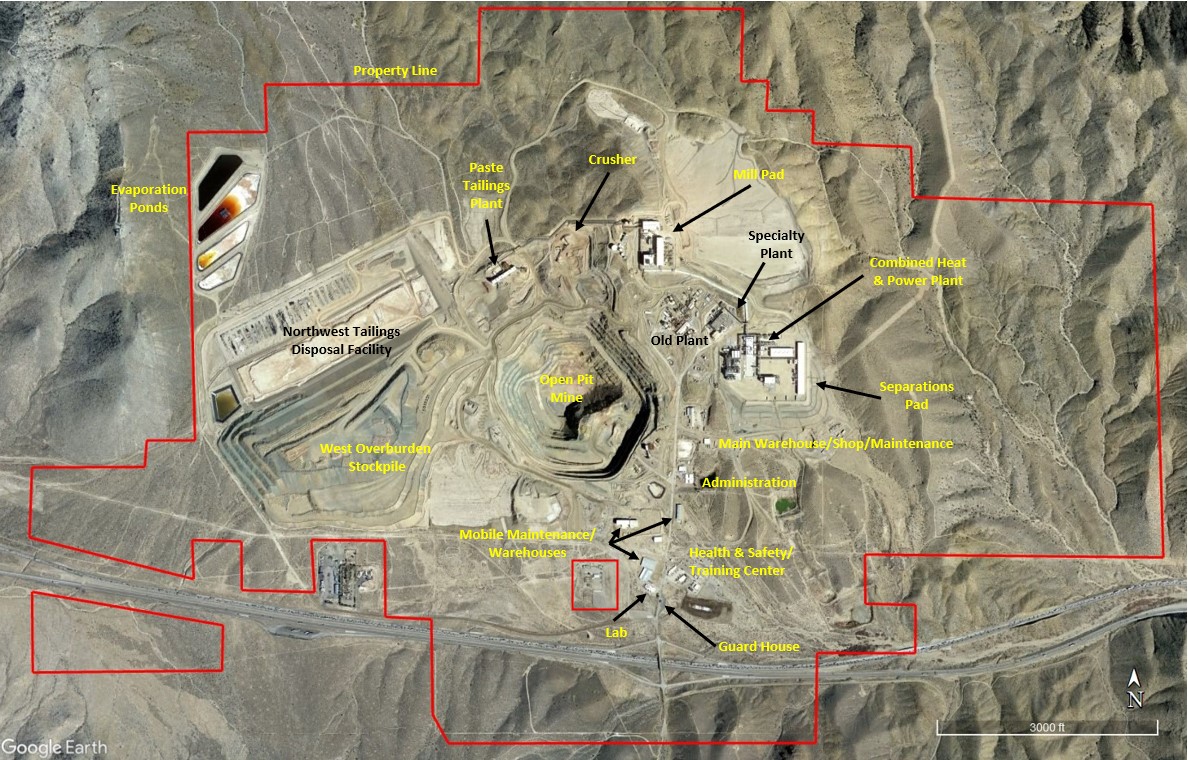
Great mine. Almost as good as Mt Weld, in Western Australia. This firm is already 14% of the global rare earths market, and exports all of that to China. In contrast, Lynas is 6% of global market and exports none of that to China. MP Materials has the plan to onshore rare earth separation in the USA and move downstream into magnet manufacture.
This is a good plan, and we cannot fault the wisdom of that for a US based entity.
However, for Australian rare earth firms, the day that Mountain Pass stops shipping rare earth concentrate to China is the day China needs a new source of rare earths that is equivalent to 14% of current global supply. If Australia adopts a strategic policy to not export rare earths to China, then our firms cannot fill the 14% gap now supplied from the USA.
You don't have to be a genius to work out the outcome.
Australia is not going to wind up with a huge new market shipping rare earths to the USA because the USA is already 14% of global production and Australia is only at 6%.
Mountain Pass already produces 2 to 2.5x the total output of the Australian rare earth industry. That material now goes to China, is separated and refined, then made into products like the rare earth permanent magnets that go into electric vehicles.
If the USA is successful in reshoring magnet manufacture, and there is no reason to doubt that, then the US domestic market can be supplied many times over by Mountain Pass.
That is why I now recommend buying MP Materials.
This policy will make life for Australian rare earth hopefuls a great deal harder.
I am an investor. I don't make Australian government policy. I am telling you this now, and I am making it crystal clear, because I think that is exactly what will happen, in consequence.
This Australian policy will serve the interests of the US Rare Earths Industry.
Invest in those firms which benefit most from US and Australian government policy.
That is clearly MP Materials.
The Story of Mountain Pass
The Mountain Pass rare earth mine has a long and storied history, being the original large hard-rock rare earths discovery, back in the 1950s. For many decades, it ruled the roost, providing the bulk of global production, until China entered the market in the 1980s.
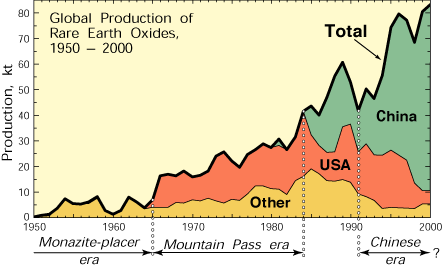
The ups and downs are clear, with different rare earths assuming prominence as the valuable and sought after item: from Lanthanum and Cerium in oil and gas catalytic cracking, through Europium, Terbium and Yttrium for color television phosphors, to the key magnet rare earths Neodymium, Praseodymium, Dysprosium and Terbium, of today.
I was an investor in the previous entity, Molycorp, that went broke when rare earth prices collapsed after China lifted their embargo on exports to Japan.
The mine first opened in 1952, operated until the first bankruptcy in 2002, due to low prices and the dominant role of Chinese mine Bayan Obo in filling the global market demand.
The mine was restarted in 2007, operated for a while, and then went bankrupt again in 2015. That one is memorable to me because I dusted 100% of my investment in the entity.
Then it languished for a few years, attracted some discussion about whether the Defense Department in the USA might help refinance it, but they said no, and so was put out to auction to be bought by a consortium with financial backing from China.
The part about the US Defense Department is amusing, in the present context, because they had a chance to bring the entity back to life under US control but chose not to.
National security is always important unless it is not important on the day the phone rings. It really sucks if it takes money away from buying weapons.
You can read about some details of the restart, and the offtake agreement that MP Materials has with Shenghe Resources, via their Singapore trading arm in the prospectus. This is all public knowledge and there is no whiff of conspiracy in any of those arrangements.
The restructuring of the firm was done under new management, who turned out to be better than the old management. They had few options to sell mine output in the USA as there is nobody there who is capable of processing the material. Shenghe Resources is a Chinese trading firm, who has access to China based processing and separation capacity.
In order to get back up and operating, MP Materials needed an offtake agreement, meaning a contract with another party to buy the product on an ongoing basis. Shenghe Resources was essentially the only party able to accept the quantity of mine concentrate needed.
Shenghe Resources are the designated "bad guy" from China. They are an international rare earth trading firm that also invests in rare earth production operations. Australian firms have trouble getting offtake, for much the same reason. Some of them are trying to deal with Shenghe Resources, and this is what upsets the Australian government.
Since the US Defense Department did not have any long-term interest in spending a billion dollars or more on building a new plant, they passed on the opportunity to help fund it.
The offtake went to Shenghe Resources, and the minerals concentrate went to China.
The US Defense Department recovered by complaining that China dominates the industry.
If you thought the whole thing was a massive Chinese conspiracy, don't. It frankly isn't.
The US Securities Exchange Commission (SEC) prospectus supplement (Dec 2020) contains the disclosure that the original Shenghe Resources offtake agreement was amended and no longer binds MP Materials to sell offtake to that party.
There are some earn out provisions, but MP Materials own disclosures, and mission:
Our Mission is to restore the full rare earth supply chain to the United States of America.
show that they are intent on onshoring their own supply chain from mine to magnet.
That process probably starts in earnest around 2024.
Why does Mountain Pass matter to Australian rare earth producers?
The message from the Australian Government towards Australian rare earth hopefuls is that they would really not like Australian companies to accept investment from Shenghe, or make any offtake agreements with them to help finance the development of Australian mines.
This policy does not apply to MP Materials, because they are not Australian.
They have their mine and operations in the United States of America.
Australian National Secuity policy to restrict Chinese investment in Australian rare earth mines, or to execute offtake agreements with Chinese firms, does not apply to US mines and firms.
They don't have to organize their affairs to be consistent with Australian National Secuity.
Clever Americans, no? Have your cake. Eat that. Then eat someone else's cake as well!
This makes MP Materials a screaming buy for Australian domiciled investors.
Don't feel bad. Your government doesn't, and it is your secure retirement that is your interest.
You should worry about your Personal Retirement Interest.
Your government is busy elsewhere, attending to other pressing matters.
Joining the dots for a local press gallery who can't hold a Crayon
From the above, you will appreciate that I think the Mountain Pass mine is an excellent rare earth deposit. It is a carbonatite, with bastnaesite mineralization, and has grades similar to Lynas Rare Earths Mt Weld carbonatite. Personally, I think Mt Weld is the better mine, but Mountain Pass is producing at more than 2x the rate, and at good margins.
Lynas Rare Earths is the good kid, and never sold any material to China. It goes to Malaysia for processing and separation, and then off to customers in Japan. None of it goes to China.
They will send some material into the USA with their new heavy rare earth processing facility.
However, if Mountain Pass proceeds with their own stated business plan to onshore processing and separation of rare earth concentrate, then 14% of global market goes back into the USA.
I have no doubt that Australian government trade delegations are vigorously making the case that the USA should really preference Australia as a friendly source of rare earths.
This is what they should do.
Will it work? Gee, I dunno. Let me think on it for a whole nanosecond. Wow, done!
Which is more friendly as a rare earths source to anybody who sits in the US Congress?
Mountain Pass in California, USA, or Mt Weld, in Laverton, Western Australia.
I can hear the exclamations across Washington DC steakhouses clean across the water.
Australia. Do we own that? What language do they speak?
You can well laugh. Laugh loud. Laugh hard.
I lived with my family in Kansas City, Kansas, good 'ole U.S. of A. way back in 1968.
My dad, who was obviously Australian, but spoke funny, was asked:
Australia. Do we own that? What language do you speak?
No joke. The locals thought he was from Austria because he was tall with sharp blue eyes.
Did not worry us much then. Does not worry me much now. I still love Americans.
I just learned what that lesson means for any investor who goes to the USA.
Our Little Quiz Question
I promised to lay out the evidence for my wild assertion that the USA is the largest exporter of unseparated rare earth concentrates to China. I know this would be "big news" to any journalist who spent the last three years writing one puff piece after another about the risk to the USA from Chinese control of rare earths.
Perhaps their brains explode on the spot? Perhaps not. Does anybody truly care? I certainly don't. The press coverage is a data free vacuum. Nothing to see, there.

What you need for soundly framed research is a good source.
I have two:
The US Geological Survey Mineral Commodity Summaries 2022
MP Materials SEC 10-K filings for their minerals production
I had to pad this post with all of the above, or it just got too darn short.
Here is the first exhibit, global rare earth production estimates for calendar year 2022.
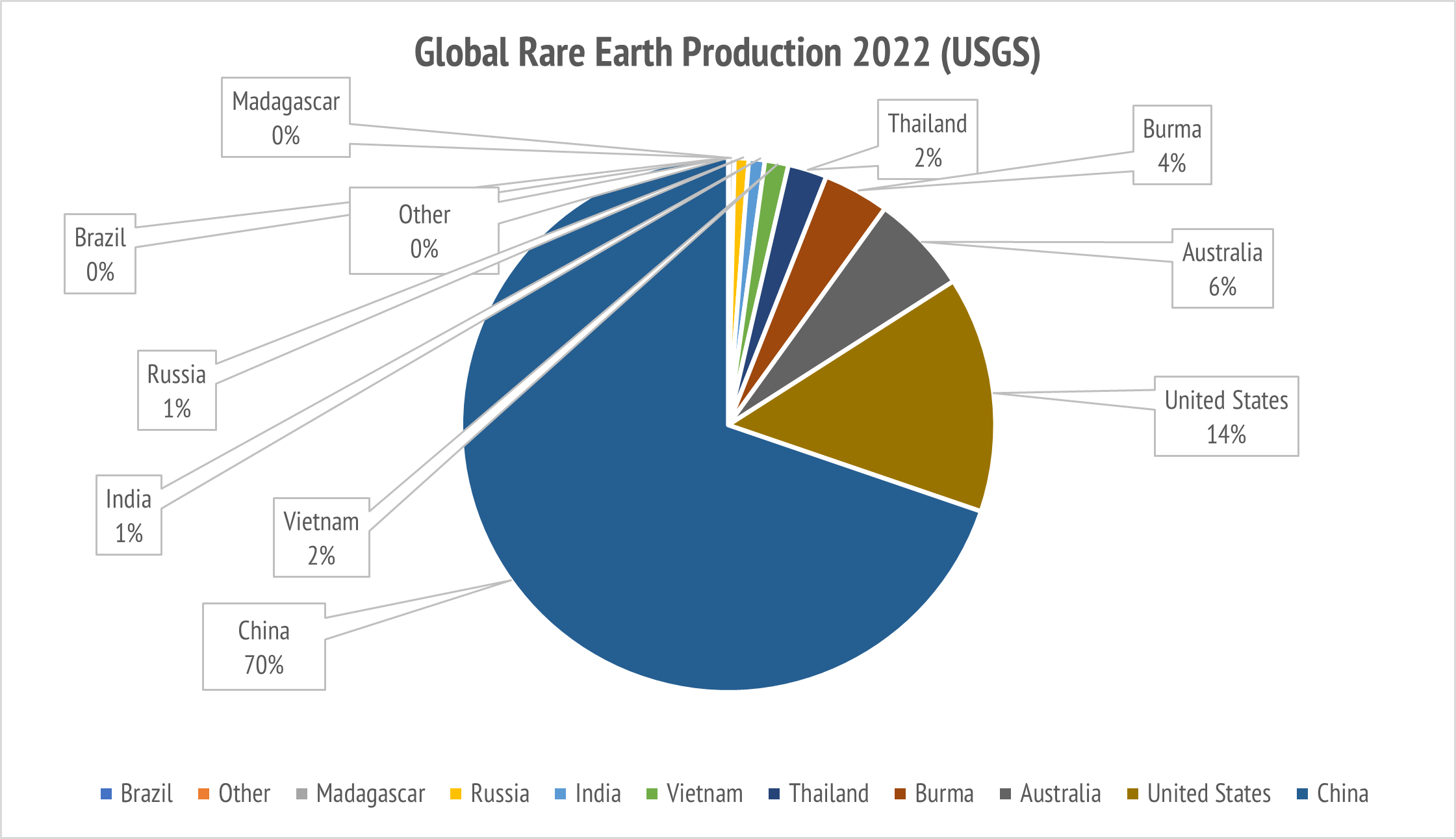
The top three are:
- China (70%)
- USA (14%)
- Australia (6%)
The Americans call Myanmar Burma, so that is 4%, and they are out of the race.
The next exhibit is also from the same USGS report, but the page before.
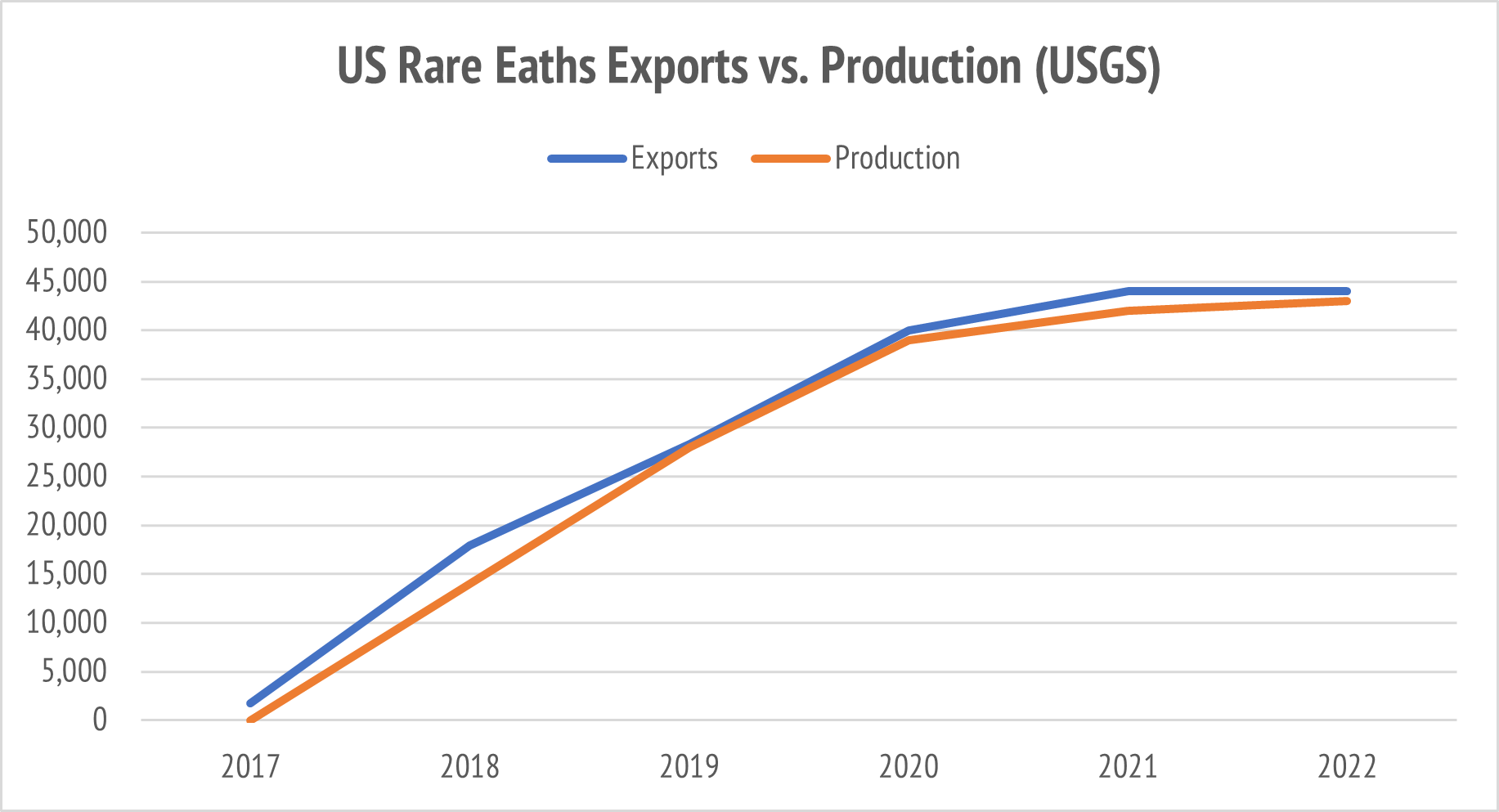
Well, I'll be damned, they look the same!
US Rare Earth exports looks like US Rare Earths production.
Mirabile Dictu! Here are the actual US sourced All-American God-Fearing numbers:
- US Mineral Concentrates (2022) form p. 142 43,000 tons
- US Exports (Ores & Compounds) from p. 142 44,000 tons
- US Mine Production (2022) from p. 143 43,000 tons
I know this sounds totally crazy, but I feel I can detect an actual pattern in those numbers.
Let's go back a few years and note US Production of Mineral Concentrates (USGS).
| Production Data USGS | |
| Year | Mineral Concentrates |
| 2017 | 0 |
| 2018 | 14,000 |
| 2019 | 28,000 |
| 2020 | 39,000 |
| 2021 | 42,000 |
| 2022 | 43,000 |
The USA went from nothing to something in 2018. Oh yeah, MP Materials restarted in 2017.
Let's now do something wild and source some data from the MP Materials (SEC) 10-K reports.
| Production MP 10-K | |
| Year | Mineral Concentrates |
| 2017 | 0 |
| 2018 | 13,914 |
| 2019 | 27,620 |
| 2020 | 38,503 |
| 2021 | 42,413 |
| 2022 | 42,499 |
US Rare Earth Exports are the same as MP Materials production.
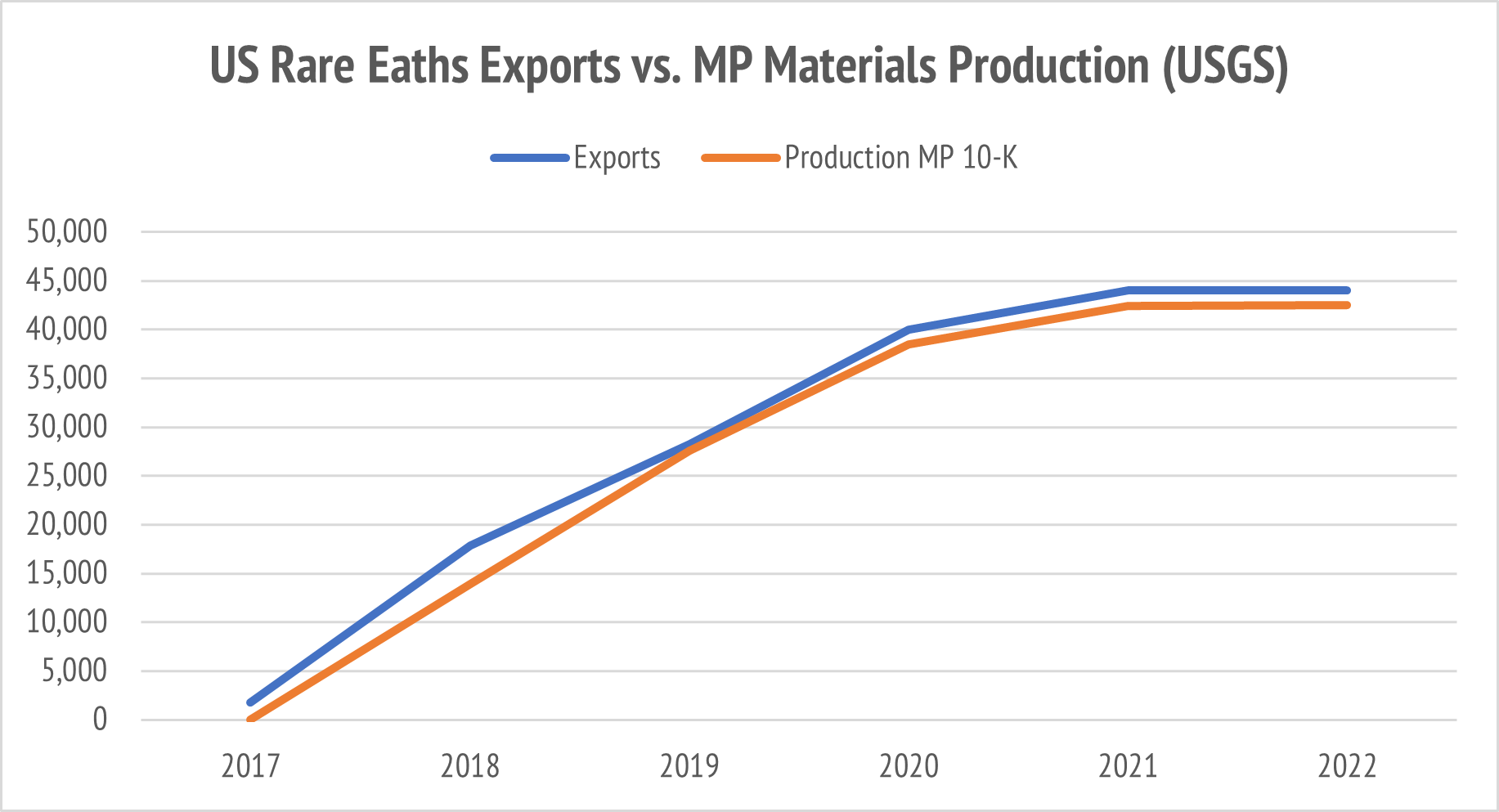
Under the emerging Australian government strategic policy for critical minerals, it would be considered extremely naughty for any Australian rare earths producer to attempt this.
They would be scolded and may even get a personal phone call from the Minister.
We are done here. You know exactly what to do.
Buy MP Materials, ticker MP.N, listed on the New York Stock Exchange.
While you are at it, get a subscription to the Wall Street Journal.
It is a newspaper. They have actual journalists who can find stuff out by themselves.
Picture credit: USGS Mineral Commodity Summaries 2023: Rare Earth Production Data.
Never miss an insight
Enjoy this wire? Hit the ‘like’ button to let us know. Stay up to date with my content by hitting the ‘follow’ button below and you’ll be notified every time I post a wire. Not already a Livewire member? Sign up today to get free access to investment ideas and strategies from Australia’s leading investors.
2 topics
3 stocks mentioned

